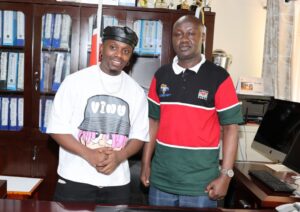HOW THIS MAN TURNED CAMEL BONES INTO MILLIONS
It is a sunny day in Burma Market and workers at Karanja’s shop are busy loading bags of bones into one his vehicles and motorbikes parked by the roadside.
Clothed in a khaki trouser, blue shirt, a white coat and gumboots, the-40-year old makes several trips in and out of his warehouse which is packed with piles of camel heads and bones in a refrigerator.
In 2002, Robert Karanja aka Waria, left Kabati in Muranga County for greener pastures in the city.
He left home with nothing and started pulling carts around Muthurwa and Burma markets. After saving Sh.8,000, he decided to try his luck in business and opened Supu ya Ng’ombe Kiosk in Burma which was closed down.
While in town, Karanja made friends; one of them was of Somali origin. They met in Eastleigh, hit it off and a business idea was conceived.
Through trust and friendship, he was able to raise some money to rent a small stall in Burma market where he set up camel bones shop.
“When I started this business I had no money to go to Mandera, Isiolo and Marsabit to buy the camels because it is costly. What I did was sell bones and heads purchased from Mlolongo slaughterhouse and soon, I had saved enough to buy my first camel,” said Karanja.
Transporting the animal from Isiolo to Nairobi was Karanja’s next headache and when he could not afford Sh.80,000 to transport the animal in a truck, he stuck a deal with a local who trekked with the animal from Isiolo Nairobi.
“Starting this business was tough. It costs Sh.80,000 to transport the camel and I had no money that time so I decided to look for someone from Isiolo who would bring the camel to Nairobi for Sh.20,000. I was restless because I was afraid the camel might die or get sick on the way. The camel arrived after three weeks and the rest is history,” he said.
Today, Karanja is a leading supplier of camel bones, a popular ingredient in supu ya ngamia kiosks spread all over towns in the country.
“At around 4pm this place is normally packed with pregnant women with their small bags to carry bones; because doctors recommend camel soup for its high calcium nutrient. Also, those who suffer from Arthritis and fractures frequent here a lot. I sell a kg of bones between Sh.100 and Sh.200 but it depends on the size.”
Every day, Karanja wakes up at 4am and, “I slaughter 10 camels daily and sell the meat in hotels across the city. One kilogramme of camel meat goes for Sh.600. I also sell camel feet and hooves to Chinese and Indians for Sh.200 per kg before I transport bones to various companies that make bone meal and ornaments. Camel oil goes for between Sh.2,500 and Sh.3,000 per mtungi.”
Every two weeks, Karanja travels to Mandera and Marsabit to buy camels at Sh.60,000 to Sh.120,000 each.
“It takes a week to go round the villages looking for the animals,” he said.
Karanja who has employed ten people can easily make Sh.1 million a month.
“This business is worth millions of shillings, I own a few stores, two lorries, eight motor bikes, three cars and I have built several flats. On a good day, I make a profit of Sh.40,000 from meat only and Sh.10,000 from bones, heads and hooves.
*Finally;*
As someone once said, opportunities come dressed in overalls.
When a Business Idea comes to you in an unexpected place, run with it
Who knows, maybe your first million is stashed right in the middle of those business ideas you have been thinking but reluctant to start.
*Written By:* Justine Nyachieo
Business Man & Mentor
+254754839228







